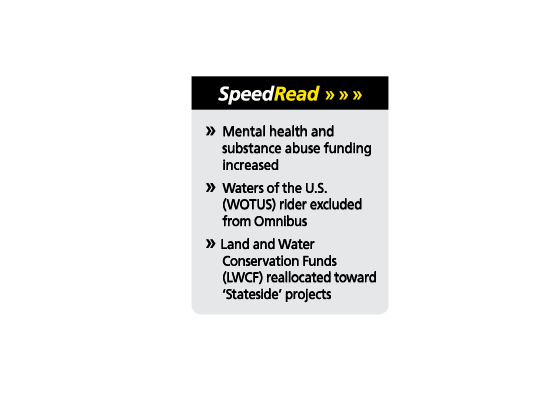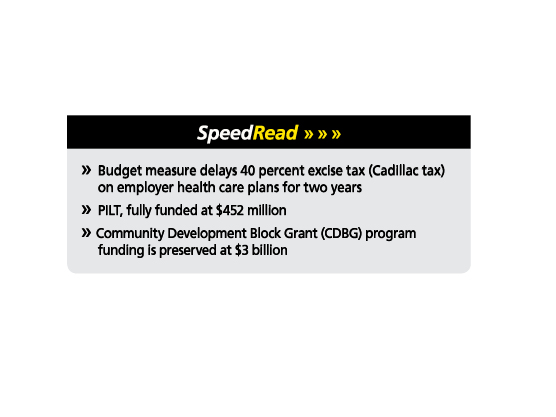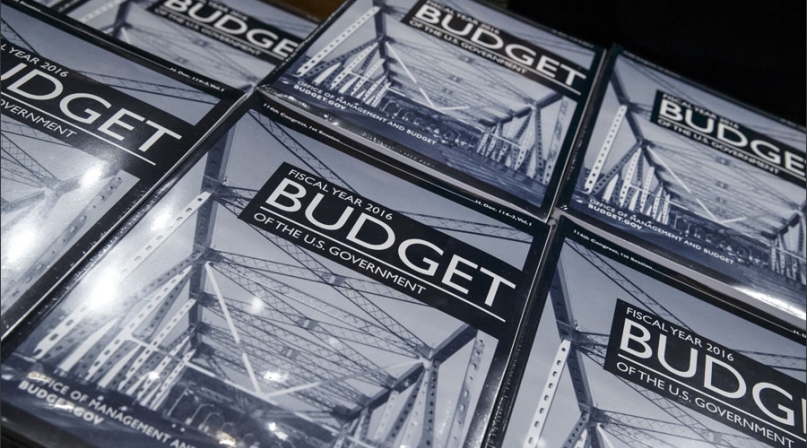Share
Line:
|
NACoTweets: counties fare well in FY16 spending bill
|
PILT fully funded, Cadillac tax put off
Averting the Ghost of Shutdowns Past, Congress passed and President Obama signed a $1.15 trillion FY16 spending bill that boosts overall federal spending by approximately 5 percent. To lend even more holiday cheer, counties fared very well in the FY16 appropriations process. Major highlights include:
- delays for two years the 40 percent excise tax on employer-sponsored health care
- fully funds the Payments in Lieu of Taxes (PILT) program at $452 million
- preserves Community Development Block Grant (CDBG) program funding at $3 billion
- increases HOME Investments Partnership (HOME) program by $50 million to $950 million
- increases the State Criminal Alien Assistance Program (SCAAP) funding by $30 million to $210 million
- increases funding for many county-administered programs, including the Substance Abuse and Mental Health Services Administration (SAMHSA) Mental Health Block Grant and the Social Services Block Grant (SSBG); and
- preserves $500 million for the Transportation Investment Generating Economic Recovery (TIGER) grant program, which counties can access for surface transportation projects, despite proposals to eliminate all funding for TIGER.
Overall, nondefense spending increases from $493.5 billion to $518.5 billion. These spending levels adhere to the caps set by the two-year budget agreement enacted in early November.
The following items are additional key funding levels and provisions in the omnibus spending bill that are important to counties.
Agriculture and Rural Affairs
Water and Waste Disposal Programs Funding Increased: The measure provides $522.32 million for the Rural Water and Waste Disposal Program (an increase of $57.37 million from FY15 levels). This program helps rural communities address the backlog of clean water and waste disposal projects.
Distance Learning, Telemedicine and Broadband Program Funding Stays Level: The bill provides level funding of $10.37 million in broadband grants for the Distance Learning and Telemedicine Program and $24.08 million in direct loans for broadband transmission and Internet services in unserved rural areas.
Rural Communities Facilities Program Changes: The bill provides a level $2.2 billion in direct loans, $148.31 million in guaranteed loans (an increase of $75.09 million from FY15 levels) and $38.78 million in grants (an increase of $12 million from FY15 levels) to help fund rural hospitals, schools and health clinics.
Housing Insurance Fund Program Gets Small Boost: The bill provides a level $900 million for Single Family Housing Direct Loans. The bill also includes $1.39 billion for the Rental Assistance Program ($301.2 million above FY15 levels), which provides assistance for affordable rental housing for low-income families and the elderly in rural communities.
Community, Economic and Workforce Development
Economic Development Administration (EDA) Funding Increased: The omnibus includes $261 million for EDA in FY16, an increase of $10 million. EDA provides grants and assistance to spur private sector job creation and economic development in local communities. The agreement also provides $15 million in assistance to coal-reliant communities.
Workforce Innovation and Opportunity Act (WIOA) Title I Programs Extended: The Employment and Training Administration is funded at $10.1 billion in the omnibus. The WIOA Title I programs are funded at $2.7 billion for FY16. This is a $100 million increase over FY15 levels. WIOA Title I programs provide funding to states and local governments to assist with employment, education and training opportunities for adults and youth.
Environment, Energy and Land Use
Waters of the U.S. (WOTUS) Rider Excluded from Omnibus: Even though there was a strong push to include provisions that would either prohibit funding or require a rewrite of the WOTUS rule, these efforts failed.
Water and Wastewater Funding Programs Receive Nearly Level Funding: The Clean Water (CW) and Drinking Water (DW) State Revolving Fund (SRF) programs were funded at $2.3 billion. CWSRF was funded at $1.4 billion and DWSRF was funded at $863 million — slightly below FY15 levels.
Brownfields Receive Level Funding: The Brownfields Infrastructure Grant program received $80 million and the Brownfield Grants for States received $47.74 million — the same as FY15.
State and Local Air Quality Management Grant Funding Remains the Same: State and Local Air Quality agency grants play an essential role in preventing and controlling air pollution at the local level. Congress appropriated $228.21 million, the same that was allotted in FY15.
Finance, Pensions and Intergovernmental Affairs
Internet Tax Freedom Act Extended: As expected, the omnibus extends the Internet Tax Freedom Act (ITFA) for another 10 months to Oct. 1. ITFA, enacted in 1998, was originally intended to be a temporary prohibition of state and local taxation of Internet access services, even though it currently allows seven states (Hawaii, New Mexico, North Dakota, Ohio, South Dakota, Texas and Wisconsin) grandfathered under the original law to collect taxes on the services.
Remote Sales Tax Legislation Excluded from Final Omnibus: Despite a strong effort from remote sales tax legislation champions in the House and Senate, bills like the Marketplace Fairness Act (S. 698) and the Remote Transactions Parity Act (H.R. 2775) did not make it into the final cut of provisions to be included in the year-end spending package. Legislation to allow state and local governments to enforce existing sales taxes on remote sales, like purchases made over the Internet, has been a long-standing priority for NACo.
 Health
Health
Mental Health and Substance Abuse Funding Increased: The HHS Substance Abuse and Mental Health Services Administration (SAMHSA) Mental Health Block Grant is funded at $533 million for FY16, $50 million more than the FY15 level. The Substance Abuse Prevention and Treatment Block Grant is funded at $1.82 billion for FY16, $38 million more than in FY15.
The agreement also directs SAMHSA to work with the National Institute of Mental Health to ensure that the increased funding available through the Mental Health Block grant goes toward evidence-based programs that address the needs of individuals with early serious mental illness, including psychotic disorders.
Prevention and Public Health Fund Fully Allocated: The omnibus fully allocates the $932 million available for FY16, including $40 million for Epidemiology and Laboratory Capacity Grants, $160 million for the Preventative Health Services and Health Services Block Grant and $324 million for Section 317 Immunization Grants.
Human Services and Education
Supplemental Nutrition Assistance Program (SNAP) Funding Decreased: The FY16 bill sets funding for SNAP at $80.85 billion. This represents a $1 billion decrease from FY15 funding levels. SNAP funding flows from the U.S. Department of Agriculture to states, which in turn distribute benefits, in some cases through county governments, to qualifying individuals. NACo supports funding SNAP at the highest possible level.
Social Services Block Grant (SSBG) Slightly Increased: SSBG receives $1.70 billion through this omnibus bill for FY16, a slight increase over FY15 funding levels. SSBG funds can be used for nearly 30 different types of services for vulnerable populations, including adult and child protective services. In 10 states, SSBG funding is provided directly to counties to administer programs.
Community Services Block Grant (CSBG) Boosted: The FY16 bill sets CSBG funding at $751 million for FY16, also a small increase over the previous fiscal year.
Justice and Public Safety
Byrne Memorial Justice Assistance Grant (Byrne JAG) Avoids Carve Out: The Byrne JAG program is funded at $476 million, which represents a $100 million increase over FY15 funding. However, this additional $100 million is allocated for the provision of security at the Democratic and Republican national conventions in 2016 and will not actually increase funding for the program.
Mentally Ill Offender Treatment and Crime Reduction Act (MIOTCRA) Programs Funded: Programs under MIOTCRA are funded at $10 million, a $1.5 million increase over FY15 funding. MIOTCRA grants are available to state, tribal and local governments to develop programs designed to improve outcomes for individuals with mental illness involved in the criminal justice system.
Second Chance Act Funding Stable: Programs under the Second Chance Act are funded at $68 million, which is the same as FY15 funding. The Second Chance Act provides resources to states, local governments and nonprofit organizations to improve outcomes for individuals returning to communities from prisons, jails and juvenile facilities.
Emergency Management Performance Grants (EMPG) Retain Funding: Funding for EMPG remains level at $350 million. Counties use EMPG funds to build and sustain core capabilities across the prevention, protection, mitigation, response and recovery mission areas. Many local governments use EMPG for emergency management training and necessary equipment.
Public Lands
Forest Management and Fire Funding Reform Excluded from Omnibus: House and Senate negotiators failed to reach an agreement on provisions that reform federal forest management and wildfire suppression funding practices.
NACo continues to support federal reforms to end the practice of “fire borrowing” and improve forest management and hazardous fuels reduction on federal lands.
The law does provide $4.2 billion to fully fund the 10-year average for wildfire suppression. It also includes $545 million for hazardous fuels reduction activities and an additional $360 million to support the U.S. Forest Service timber program, an increase of $40 million across the two programs.
Land and Water Conservation Funds (LWCF) Reallocated toward Stateside Projects: Congress provided a total of $450 million to support activities under the LWCF. Of these funds, approximately 25 percent are made available to the “Stateside” grant program, competitive grants available to counties and other local governments to establish locally supported outdoor recreation projects and facilities. As a matter of comparison, in FY15 the “Stateside” grant program received about 16 percent of total LWCF funds. Approximately 50 percent of FY16 LWCF funds are made available for federal land acquisition programs. In FY15, more than 60 percent of LWCF funds were devoted to federal land acquisition.
National Park Service (NPS) Receives Additional Funds to Address Maintenances Backlog: The NPS received an increase of $237 million — $2.9 billion in total funding for FY16 — to support its operations for the coming year. Of the $237 million increase, the NPS must use $94 million to reduce maintenance backlogs and address other priority issues related to the NPS centennial this year.
Bureau of Land Management (BLM) Receives Additional Funds to Reduce Grazing Permit Backlog, Conserve Sage-Grouse Habitat: The omnibus spending bill included an increase of $1.5 million ($79 million in total) in FY16 to make additional resources available to reduce the backlog of grazing permit applications. The bill also included $60 million within the Bureau of Land Management budget for sage-grouse habitat conservation activities. Total funding for the BLM reaches $1.2 billion for FY16, a $117 million increase over FY15.
Policy Riders Address Public Lands Concerns: The bill contains a number of policy riders to address public lands policy concerns including:
- a provision requiring the Department of the Interior and the Forest Service to report on nonemergency closures of public lands to hunting, fishing, shooting and other recreational activities
- a prohibition on funding the Fish and Wildlife Service’s efforts to issue further rules to place sage-grouse on the Endangered Species List
- a prohibition on the Department of the Interior from administratively creating new wilderness areas, and
- a directive that the Forest Service, National Park Service and BLM work with state and local governments in drought-stricken regions to facilitate the prompt removal of hazardous trees on these lands and to prioritize funding to reduce the threat of wildfire.

Telecommunications and Technology
Cybersecurity Information Sharing Act of FY15: The omnibus appropriations bill includes the Cybersecurity Information Sharing Act of FY15 (S. 754), which will create a legal pathway for the federal government to exchange cyber-threat data with state and local governments, as well as the private sector. The bill is also intended to help prevent cybercrimes and data breaches like the ones that have compromised the sensitive data of millions of consumers, as well as current and former federal employees.
National Cybersecurity Protection Advancement Bill: The omnibus appropriations bill also includes the National Cybersecurity Protection Advancement Act of FY15 (H.R.1713). This bill directs the Department of Homeland Security to establish a National Cybersecurity Preparedness Consortium, which among other duties, would train state and local first responders and officials to prepare for and respond to cyber-attacks, as well as incorporate cybersecurity emergency responses into existing state and local emergency management functions.
It also expands the role of the National Cybersecurity and Communications Integration Center (NCCIC) to collaborate with state and local governments on cybersecurity risks and incidents.
Transportation
Level Funding for the TIGER Grant Program: The Transportation Investment Generating Economic Recovery (TIGER) grant program receives the same funding as FY15 — $500 million. It provides discretionary grants to transportation projects of national or regional significance.
$2.18 Billion for New Starts Projects: New Starts Projects are funded at $2.18 billion, $1 billion less than requested by the president but slightly above FY15 appropriations levels, which will fully fund all current Full Funding Grant Agreement (FFGA) projects, as well as support new projects anticipated to receive FFGA awards in FY16. This amount will also provide funding for all pending small starts projects included in the president’s request and an additional $50 million for core capacity projects.
Funding for Federal Highway and Transit Programs Funded through the Highway Trust Fund is Consistent with the Levels Set by the FAST Act: Federal transit programs receive $11.76 billion in funding, while highway programs are provided $42.36 billion.
Funding Increased for Essential Air Service: The Essential Air Service receives $175 million, a $20 million increase form FY15, with an overall estimate of $275 million available for the program when combined with over- flight fees collected for the mandatory portion of the program. Combined, the discretionary and mandatory funding subsidizes airlines for continued commercial service to eligible communities.
Airport Improvement Program Receives Level Funding: The Airport Improvement Program receives $3.35 billion, which is consistent with levels authorized by the FAA Modernization and Reform Act of 2012. The program provides grants to airports for development and planning.
$5 million to Carry Out the Small Community Air Service Development Program: The Small Community Air Service Development Program receives $5 million for FY16, about $500,000 less than FY15. The program provides grants to help small communities address air service and airfare issues.




 Health
Health
